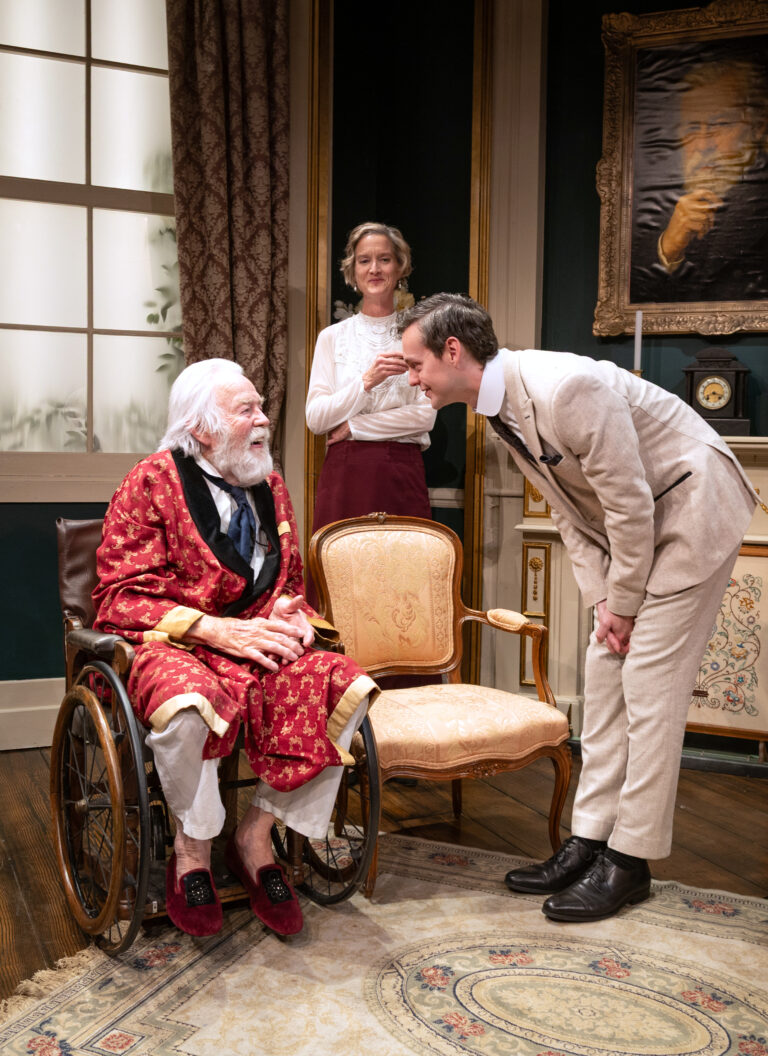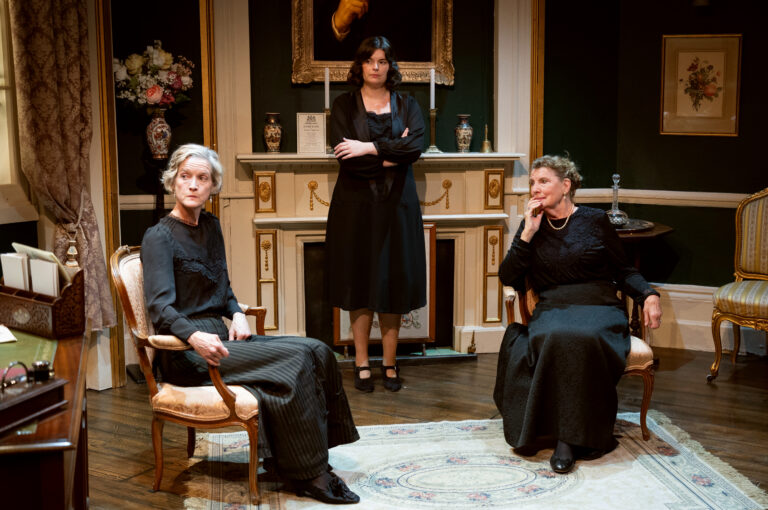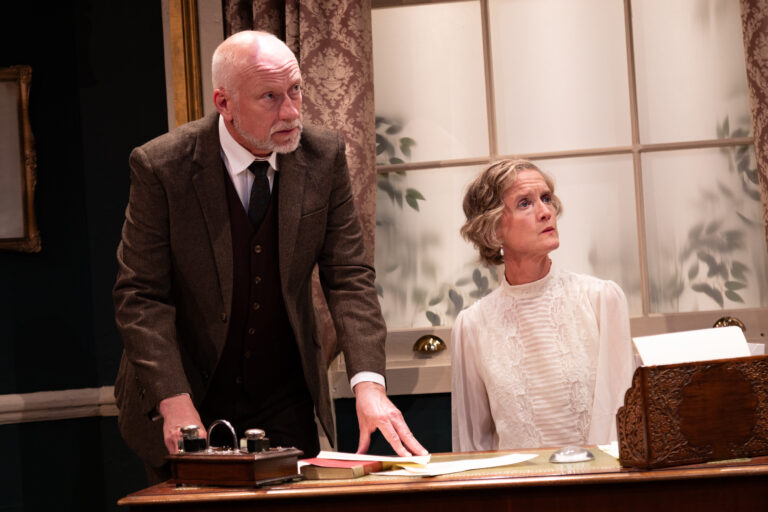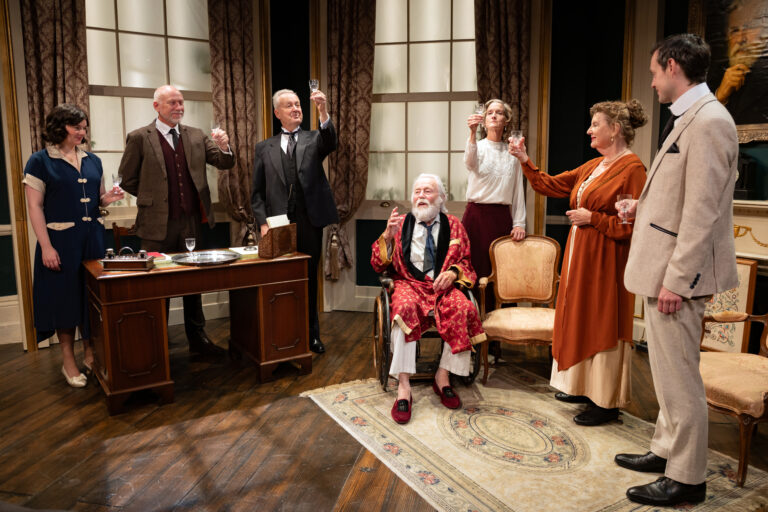Review by Simon Jenner, September 19 2025
★★★★★
Neil McPherson and the Finborough have managed it again. Another play indeed playwright this time hiding in plain sight is revealed as subtle, prescient and copper-bottomed in its three-act solidity: one faithfully set here by Alex Marker. Whether there’s a whiff of Shaw, Barrie, Ibsen or Somerset Maugham hardly counts. In partnership with producer and specialist Andrew Maunder, A. A. Milne’s The Truth About Blayds directed by David Gilmore at Finborough till October 4 is more modern in one sense than most. Identity is on Parade.
There’s a lesson in JM Synge’s The Playboy of the Western World that someone can become what people think of them. It’s piquant that successful playwright, detective novelist and sometimes poet A. A. Milne should write a play about a poet who’s managed just that. Indeed, Milne can forge, as it were, rather good Victorian verse. In his 1921 work, Oliver Blayds is every inch the 90-year-old poet lionized by every Victorian and now even Georgian. He’s a consummate raconteur even in age, someone who’d be a whizz at social media and networking. Adored by all in fact. Pity he didn’t do it all himself. Except for one, poorly-received volume, “the 1863” which becomes a comedic refrain. Milne’s particularly adept at running jokes and running characteristics. The way “hallucination” and “politician’ are used is masterly. There’s an acerbic eye on more than one character. There’s a whiff of sentiment too, but more than that, true feeling. If there’s deceit and delusion, the degree of self-delusion and justification is magnificently pitched. It becomes the defining hallmark of this minor classic.

William Gaunt, Catherine Cusack, George Rowlands. Photo Credit: Carla Joy Evans
Marker’s set is a solid study lit by Jonathan Simpson with suggestions of Kensington and inside a smart study where a desk dominates stage-right and opposite, an impressive painting of Blayds himself: one who looks askance at smoking. We don’t meet Blayds till towards the close of Act One; he doesn’t appear again.
It’s the arrival of A.L. Royce, distinguished writer (Rupert Wickham), which sets off the family’s ambivalent character. Royce, admirer of Blayds, leads a delegation of younger writers paying homage. Wickham’s light eyebrow-raising way of repeating keywords with an aspirate is wholly lost on his main butt. This is Oliver Blayds-Conway, the poet’s grandson, winningly, even wickedly portrayed by George Rowlands. Now 23, Oliver had vaguely wanted to be an engineer but the poet decreed he’d make a politician and pulled strings. The superficial Oliver’s now PA to a politician and met Royce at his club. He admits gracefully neither job nor club came but through his surname. Elsewhere his equivocations, shallowness and self-deceptive blinders (beautifully rendered through keywords) make him lead Royce to tell him he’d waste himself being anything else. An irony wholly lost.
By contrast his downright sister Septima (Lucy Jameison) is sharper, truthful, a study in self-interest; refusing, though, to let it blind her to her own selfishness. Money and “in a way to which we’ve been accustomed” is a watchword: though as a means to independence. Jamieson relishes the mix of frankness and sideslipping. And there’s a delicious series of bets the siblings play with Royce, including anyone who quotes the poet on hearing her singular name. Like her brother, Septima’s desire to set up a studio with a friend has been thwarted by her grandfather. But is it merely evanescent? Each thwarting of merely toyed-with ambitions are seen for what they are.
They extend to their blustery father William Blayds-Conway (Oliver Beamish) even more prone to self-deceit than his children, and truly fitted for the (again, ordained) role as his secretary. As Royce later observes sharply, William is a born secretary; he’d always have been a factotum to someone. The illusion of a life wasted is rubbish. Beamish harrumphs his pomposity with a touch of the delicious. Marion Blayds-Conway, the poet’s eldest daughter, is mocked. Karen Archer brings out Marion’s comical delusions with a fluffy comfort blanket of platitudes, fussing her incomprehension. A superb essay in obliviousness, it strikes with a horrible period truth, if a touch cruel.
The toll on Blayds’ family falls chiefly in younger daughter Isobel (Catherine Cusack) whom Blayds (William Gaunt) has gently blackmailed into looking after him for many years. Far more intelligent than her immediate family, she’s dismissed as “a born nurse” who would naturally never marry. But her sacrifice ensuring she turned down an offer of marriage to one. No-one knows, but it was Royce. The tender shock of recognition of their meeting after 18 years is moving. As is the Strauss waltz (sentimental, but who cares?) drifting through their conversation as they recall. Isobel declares the Isabel then was dead. Her consolation is helping inspire her grandfather to writes his few last poems.

Catherine Cusack, Lucy Jamieson, Karen Archer. Photo Credit: Carla Joy Evans
Gaunt emerges sovereign in his brief fluttery repeats, edging to articulate a memory, suddenly sharp with barking dictats. Gaunt can still frighten. His Blayds mixes sharp memory – he recalls meeting Royce 18 years ago – with a benign despot, ensuring the whole family follow orders. Only Marion as lowly wife and mother, seems to have escaped being assigned a role. Gaunt never parodies the poet’s frayed sentences, calling on Cusack’s Isobel to prompt him. Gaunt’s gimlet eye misses nothing. And he has a surprise prepared for Isobel as Act One closes.
Acts Two and Three take place with two changes of costume (impeccably curated by Carla Joy Evans throughout). Isobel has been burdened with something that makes her now the key protagonist, resisting her initially (and in some cases still) incredulous, backsliding, delusional family. The end of Act Two is particularly moving. Isobel spells out just what her grandfather has really cost her – as opposed to the faux-sacrifices of everyone else.
Milne though refuses an easy moral binary. The play’s title ripples through delectable options. Key here is the relationship between Royce and Isobel, as Royce returns in Act Three as a fixer. The tenderness of their increasing rapprochement is struck through with moral quandaries. The shock and denial of family is rendered like a chime from Marion’s contortions (“How could a man who wrote such…”) through to Septima’s refreshing bluntness. “You’re honest at least” Isobel thanks her. The men though with Oliver’s inspiration of a final “hallucination” are fixed like a musical leitmotif passed round like straw that a sliver from the Cross. And “the 1863 volume” gag ensures there’s even more laughs in Act Three. Beyond this though is even Isobel wholly justified; what are her motives? She can only discuss these intimately. The surprise ending is something else Milne conjures. One that no other dramatist of that era would contemplate.
An essay in identity and illusion, authorship, and heredity, The Truth About Blayds upends fundamentals of civilisation in a drawing-room. Neatly edited, running for two hours fifteen with interval, this is a classic revival of a minor classic. Pacily directed and with a consummate cast, this production couldn’t be bettered. Other Milne discoveries await. Two in particular – Mr Pym Passes By from 1919, and The Dover Road, from 1922 – might just be revived yet, knowing this team.
Stage Manager Catherine Campbell, Production Photography Carla Joy Evans.
General Manager Tara Marricdale, Assistant General Manager Silvia Verzaro, Assistant Resident Director Jillian Feuerstein, Cover Art Designer, Jillian Feuerstein
Producer Andrew Maunder in association with Neil McPherson for the Finborough Theatre.
Rupert Wickham, Catherine Cusack. Photo Credit: Carla Joy Evans



